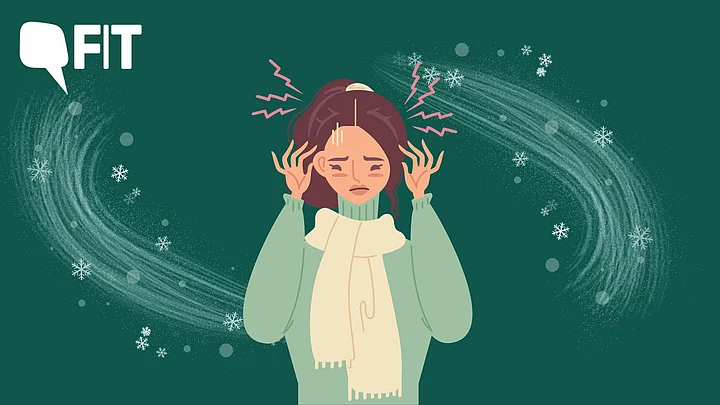Many people who suffer from migraine may experience it even more intensely as the weather shifts, and with the dip in the temperature during winter months.
Why does this happen? Is there a way to fix these headaches? Can they be prevented?
To answer these questions and more we spoke to two experts - Dr P.N. Renjen, Senior Consultant, Neurology, Indraprastha Apollo Hospitals and Dr Manoj Khanal, Associate Director and Unit Head – Neurology, Max Super Speciality Hospital, Shalimar Bagh who help us understand better.
Why do migraines get worse during winter?
Migraines are very common during the winter season as the drop in the temperatures, and the short duration of sunshine can lead to an alteration in the atmospheric pressure.
The change in pressure can cause hemodynamic (internal blood pressure mechanism) changes in the body, leading to migraines.
Additionally, here are the reasons that can trigger more migraines:
Snowstorms, which brings sudden dips in atmospheric pressure
Dry air, which can lead to dehydration (a common migraine trigger)
Indoor heating, which further dries the air and triggers dehydration and migraines
Extreme temperature changes between indoors and outdoors
And cold drafts that come in from windows and doors
What are the triggers for migraines during winter?
Here are some causes that lead to migraines during winter:
Changing barometric pressure: Barometric pressure, also known as atmospheric pressure, is a potential trigger for people with migraine. It fluctuates as the seasons change, and those variations can provoke a migraine attack.
Stress during cold weather
Dehydration
Dry air
For some people, weather changes may cause imbalances in brain chemicals, including serotonin, which can prompt a migraine attack.
How can one protect themselves against winter migraines?
During winter, keeping yourself consistent in order to avoid recurring migraine attacks is really necessary. Moderation of extremes also plays a very important role. One can protect themselves by doing the following:
Avoid exposure to cold air. Keep the homes well-ventilated and use exhaust fans to avoid carbon monoxide poisoning.
Use humidifiers at home and keep indoor humidity between 35 to 50% to avoid dryness.
Make sure to get good quality sleep at night.
Do not skip meals and have healthy snacks from time to time
Hydrate yourself well as dehydration could cause headaches. Avoid too much caffeine, tea, alcohol or tobacco.
Ensure good intake of Vitamin D-rich foods like fish and eggs. One can take supplements of Vitamin D if you are deficient.
Avoid intake of MSG found in soups as it triggers migraine headaches.
Regular exercise of moderate intensity for 30 minutes like walking, cycling, or indoor online workouts will help you feel fit and keep headaches at bay.
How to fix migraines in winter?
While it's definitely better to prevent it from happening in the first place, here's what you can do to fix it if get an attack.
Consult a Doctor: Do not take migraine medication without proper consultation.
Try a Cold Pack: If a person is suffering from migraine, place a cold pack on the forehead. Ice cubes wrapped in a towel, a bag of frozen vegetables, or even a cold shower may ease the pain. Keep the compress on the head for 15 minutes, and then take a break for 15 minutes.
Use a Heating Pad or Hot Compress: If a person has migraine, place a heating pad on the neck or the back of your head. If they have a sinus headache, hold a warm cloth to the area that hurts. A warm shower might also do the trick.
Dim the Lights: Bright or flickering light, even from the computer screen, can cause migraine headaches.
Wear sunglasses outdoors. Many might also add anti-glare screens to the computer and use daylight-spectrum fluorescent bulbs in your light fixtures.
Hydrate: Drink plenty of liquids. Dehydration can cause a headache or make one worse.
Get Some Caffeine: Have some tea, coffee, or something with a little caffeine in it. This can help ease the migraine pain.
(At The Quint, we question everything. Play an active role in shaping our journalism by becoming a member today.)
